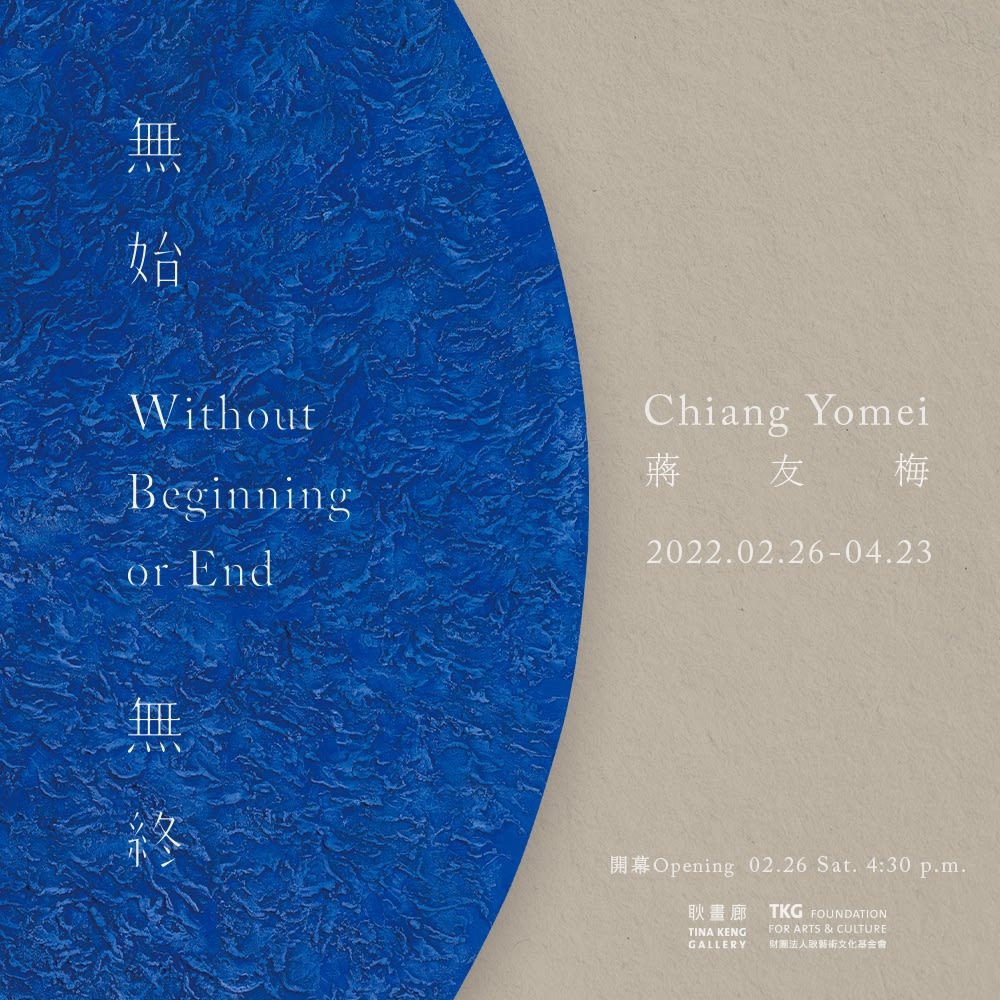Without Beginning or End: Chiang Yomei Solo Exhibition
Without Beginning or End: Chiang Yomei Solo Exhibition
-
Overview

Dates
19 FEBRUARY - 23 APRIL 2022
Reception
26 FEBRUARY, 4:30 p.m.
Tina Keng Gallery 1F, No.15, Ln. 548, Ruiguang Rd., Neihu Dist., Taipei 114, Taiwan
[N]othing, not even the apparent start of time and space, can come about without causes or conditions. In other words, nothing can start to exist or cease to exist. There can only be transformations. The Big Bang must then be a mere episode in a continuum without a beginning or an end.
Matthieu Ricard, The Quantum and the Lotus
-

For spring 2022, Tina Keng Gallery is pleased to present Chiang Yomei’s first solo exhibition in four years: Without Beginning or End. Traversing multiple media including oils, Chinese ink, and collage, this new body of work reveals the philosophical spectrum that radiates from Chiang Yomei’s inimitable artistic vocabulary. The artist conveys her contemplation of connections between various religions, rites, fables, and philosophies through paintings that translate bodily rituals into canvases full of poetic oils and accordion albums filled with ink traces. Each work — an abstract narrative that unifies form and emptiness — depicts a state of existence that embodies both birth and demise with neither beginning nor end, in a love song to the universe and life.
The “Cold Mountain” series emerged from a unique experience that had occurred at the beginning of 2020, when Chiang reread the work of Tang-dynasty monk poet Han Shan during the pandemic lockdown, transporting her from the reality of home confinement to an imaginary landscape. To Chiang, Han Shan’s poetry comprises not only hymns that reflect the philosophical teachings of Buddha, but also writings on philosophy, rural life, mountains and woods, and celebration of objects in poetic discourse. Upon closer reading, it is easy to see Han Shan’s nuanced sentiment resonate exquisitely with the world, as well as a cosmology that resonates from the heart, unbound by time or space. The developmental trajectory of the “Cold Mountain” series organically evolved from reading and meditation into wielding the brush to paint. She chose the dialogue between water and ink as a response to Han Shan’s poetry. Applying water before ink, the artist allows the two to blend in intuitive rhythm, while sprinkling salt onto ink to conjure a temporal sense of erosion. This is followed by overlay and collage techniques to capture the intermittent layers of imagery in thought and memory. The defined boundaries resulting from collage create white space evocative of the act of “leaving spaces” (liu bai), a traditional literati practice which deconstructs the sense of space-time continuity through “emptiness;” much like a moment of clarity in an undulating sea of thoughts. This Han Shan travelogue written in another dimension at the Fish Mountain Studio[1] becomes a dialogue between Chiang and the masters that spans time and space.
Debuting at this exhibition is the “Without Beginning or End” series where, continuing in her iconic deconstructed Heart Sutrapaintings, Chiang transcribes the entire Heart Sutra onto a circular canvas that measures five feet in diameter, using adhesive, sand, and incense ash, deconstructing the text simultaneously. When completed, what is left are the ghostly remnants of the Sutra and the intention behind the process of transcription. Oil paint is applied after the first layer dries. The circular canvas with an opening at its center corresponds to the form of ancient bi jade that honors the heavens, the cyclical nature of seasons, and movement of the stars, while resonating with the core Buddhist philosophy of “That which is not born will not perish, that which has life must perish.”
-
Works
-
In the past decade, Chiang’s painting and poetry has transitioned from a vessel of personal emotion seen in her solo exhibition Spark[2], into something lighter, unburdened, and liberated. In this process, the boundary between the temporospatial duality of memory and thought have seemingly become obscured, precipitating a shift in the artist’s perception and focus from the self into external dimensions. In the works unveiled in the current exhibition, there is an increasingly abstract visual expression and an essence of being that manifests the artist’s progression in her own state of existence, as Chiang Yomei pens in the poem “Delos”[3]:
Presence in absence
Shadows shape-shifting
with each retelling
Silent footfalls
awaken the dust of time
Images
whirling like dervishes
in my mind
Listen:
Luminous song
unfurling from the source
Resounding
with echoes from other worlds
[1] Fish Mountain Studio is the name of artist Chiang Yomei’s studio in London.
[2] Spark was the title of Chiang Yomei’s 2011 solo exhibition at Tina Keng Gallery.
[3] “Delos,” a poem eponymous to Chiang Yomei’s 2019 painting series references the Greek island on the Aegean Sea, the mythical birthplace of Apollo. It is a site central to ancient Greek mythology and religion.
-
-
-
Artist
This website uses cookies
This site uses cookies to help make it more useful to you. Please contact us to find out more about our Cookie Policy.












